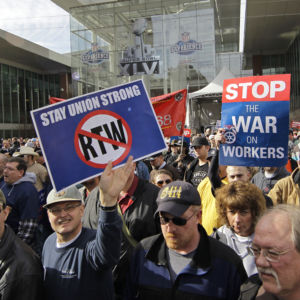Labor unions oppose few policies more than they do right-to-work laws. But one former state union president Friday endorsed the policy as a critical workplace right.
Ben Johnson has served as a union president for both the Vermont AFL-CIO and the state chapter of the American Federation of Teachers (AFT). But upon leaving the unions, he began to reconsider his views on labor matters. His chance to reflect brought him to favor a policy that is paramount to sin in union circles.
Labor unions have long denounced right-to-work as an underhanded attack on unions and worker rights. The policy outlaws mandatory union dues or fees as a condition of employment. Johnson argues it is time to eliminate forced dues so that all workers have the right to choose whether to join a union.
“I support right-to-work nationwide in the private sector, in the public sector, in any other sectors that unions create, full stop,” Johnson said in an online video. “I think it’s time to eliminate unions’ right to collect mandatory agency fees from non-members.”
House Republicans introduced a bill Feb. 1 aimed at making union dues and fees optional for all workers. The U.S. Supreme Court may soon consider a case that would end forced dues for all public-sector workers. Johnson argues both would be a huge win for worker freedom.
The National Right To Work Committee (NRTW) published the video to give the former union president a chance to express his views. He took the opportunity to detail how he came around to support a policy he was taught to hate. The NRTW has been at the forefront of advocating for right-to-work laws.
Labor unions and their supporters argue that optional dues encourage workers to free-ride. They are obligated to represent all workers regardless of whether they pay dues once they get voted in as the exclusive representative. The U.S. Supreme Court affirmed the union position in the 1977 case Abood v. Detroit Board of Education.
“The union is obligated to give them the same representation it gives to all the members who actually pay dues, so why give people a way to get something for free,” Johnson said. “Except wait. Unions choose to bargain contracts that cover the entire bargaining unit, members or not. They could bargain contracts that cover only members.”
Labor unions often overlook that being an exclusive representative isn’t the only way they can organize. Member only unions aren’t obligated to represent nonmembers or anyone not paying dues or fees. The downside is they lose monopoly rights which block other labor groups from trying to organize established bargaining units.
Johnson recalls working on an ambitious campaign to organize childcare providers throughout his state. The campaign was modeled after what unions in other states did like the Service Employees International Union (SEIU). Many of the providers were just individuals providing a service through state subsidies.
“This was the leading edge of public sector union organizing,” Johnson said. “Bring quasi-public employees into the union. There were thousands of individuals and centers providing childcare in Vermont and participating in a program where they would be paid a subsidy by the state to provide childcare for low-income families.”
Johnson describes how they created a bargaining unit where one really didn’t exist. The childcare providers were independent contractors and small business owners. The plan was to organize in the field while pushing legislation that classified the providers as state employees for the purpose of organizing.
“If you think that scheme doesn’t have much in common with the normal agency fee case I laid out earlier, you’re exactly right,” Johnson said. “Of course it doesn’t. It uses agency fees as a strategy to build a union that we never even dreamt would be supported by a majority of the providers. In fact, it is more likely true that even if we had succeeded at any given time a majority of the providers would not even have known there was a union.”
Johnson notes that they didn’t even expect to get much in the way of additional funds. It was unlikely they would get enough dues paying members after the cost it took to organize them. Rather the idea was to become the voice of a sympathetic group that talks to many people which could be leveraged for political reasons.
The U.S. Supreme Court dashed their plan with a decision that halted similar union campaigns in states across the country. Harris v. Quinn determined in 2013 that states cannot make laws that allow unions to collect dues from people who weren’t workers in a bargaining unit.
“I don’t expect to bring around to my way of thinking any union officers or staff still in the wilderness,” Johnson said. “To them the words and arguments I utter are only tools the forces of capitalism use to bust the union. In the union view, the only analysis that counts is the one that says without bargaining unit contracts and agency fees unions will be weaker.”
Johnson recalls that his motivation was primarily to seek power for the union. The labor culture was combative as a means of survival, but that often put the union at odds with everyone else including their members. He was finally able to see things from a different perspective when he left just a few years ago.
The Vermont AFL-CIO and AFT Vermont did not respond to a request for comment by InsideSources.

